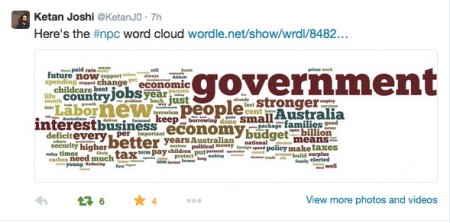The Prime Minister’s much-anticipated speech to the National Press Club today was a reminder – if we needed one – that public health concerns are not high on his agenda.
You can read the full speech here, or try this summary by The Guardian’s Lenore Taylor.
Or, some short versions from the Twittersphere:


The Twittersphere also noted the absence of even token references to Indigenous health, climate change or other significant public health concerns.



It was not only what the PM failed to mention that drew note, but also what journalists failed to raise in questions.


As Stephen Mayne suggests (above and below), far more interesting than the PM’s speech was the Australian Electoral Commission’s release of donations to registered political parties during 2013-14.

Here is the searchable database (if any readers are interested in doing a public health analysis, please get in touch).
The Guardian’s analysis includes a list of top 20 donors, and the Philip Morris contributions to the Liberal and National Parties have also drawn attention.


Medical journalist Michael Woodhead highlights the one of the ways the private healthcare lobby exerts influence:

Meanwhile, amid all the loud noise over the Queensland election result, it might have been easy to miss this remarkable story – about the owner of Brisbane clubs texting patrons to caution them against voting for Labor.
The Katrzyna Group, which owns popular nightspots Family, Press Club and Cloudland, reportedly sent a text to people on the clubs’ database, encouraging them think about their vote, in response to Labor’s plans for a 1am pub and club lock out.
However, the story quotes many examples of patrons responding with angry messages on Facebook. The text campaign clearly didn’t achieve the desired result.
The Public Health Association of Australia (PHAA) has welcomed the Queensland election result as a message that Australians believe in “a fair go”.
The PHAA says the three areas where the Abbott Government should resurrect a fair go are:
- in ensuring an equitable, universal healthcare system;
- abandoning “vicious” cuts to foreign aid that undermine our security; and
- abandoning plans to entrench inequitable access to higher education.
Judging by his performance today, however, the Prime Minister does not consider that ensuring a “fair go” for the wider community might also help his own uncomfortable position.
